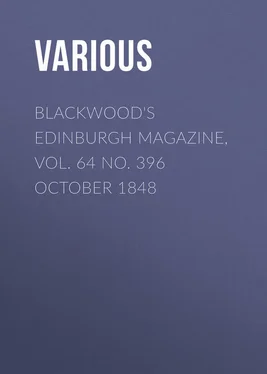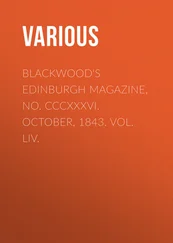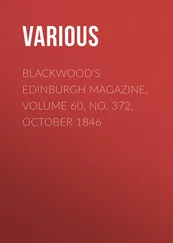Various - Blackwood's Edinburgh Magazine, Vol. 64 No. 396 October 1848
Здесь есть возможность читать онлайн «Various - Blackwood's Edinburgh Magazine, Vol. 64 No. 396 October 1848» — ознакомительный отрывок электронной книги совершенно бесплатно, а после прочтения отрывка купить полную версию. В некоторых случаях можно слушать аудио, скачать через торрент в формате fb2 и присутствует краткое содержание. Издательство: Иностранный паблик, Жанр: periodic, foreign_edu, Путешествия и география, на английском языке. Описание произведения, (предисловие) а так же отзывы посетителей доступны на портале библиотеки ЛибКат.
- Название:Blackwood's Edinburgh Magazine, Vol. 64 No. 396 October 1848
- Автор:
- Издательство:Иностранный паблик
- Жанр:
- Год:неизвестен
- ISBN:нет данных
- Рейтинг книги:4 / 5. Голосов: 1
-
Избранное:Добавить в избранное
- Отзывы:
-
Ваша оценка:
- 80
- 1
- 2
- 3
- 4
- 5
Blackwood's Edinburgh Magazine, Vol. 64 No. 396 October 1848: краткое содержание, описание и аннотация
Предлагаем к чтению аннотацию, описание, краткое содержание или предисловие (зависит от того, что написал сам автор книги «Blackwood's Edinburgh Magazine, Vol. 64 No. 396 October 1848»). Если вы не нашли необходимую информацию о книге — напишите в комментариях, мы постараемся отыскать её.
Blackwood's Edinburgh Magazine, Vol. 64 No. 396 October 1848 — читать онлайн ознакомительный отрывок
Ниже представлен текст книги, разбитый по страницам. Система сохранения места последней прочитанной страницы, позволяет с удобством читать онлайн бесплатно книгу «Blackwood's Edinburgh Magazine, Vol. 64 No. 396 October 1848», без необходимости каждый раз заново искать на чём Вы остановились. Поставьте закладку, и сможете в любой момент перейти на страницу, на которой закончили чтение.
Интервал:
Закладка:
"Pisistratus," said my father softly, "I fear you have forgotten the saffron bag."
"No, indeed, sir," said I smiling.
"He," resumed my father – "he who wears the saffron bag has more cheerful, settled spirits than you seem to have, my poor boy."
"My dear Austin, his spirits are very good, I think," said my mother anxiously.
My father shook his head – then he took two or three turns about the room.
"Shall I ring for candles, sir, it is getting dark: you will wish to read?"
"No, Pisistratus, it is you who shall read, and this hour of twilight best suits the book I am about to open to you."
So saying, he drew a chair between me and my mother, and seated himself gravely, looking down a long time in silence – then turning his eyes to each of us alternately.
"My dear wife," said he at length, almost solemnly, "I am going to speak of myself as I was before I knew you."
Even in the twilight I saw that my mother's countenance changed.
"You have respected my secrets, Katherine, tenderly – honestly. Now the time is come when I can tell them to you and to our son."
CHAPTER XXX.
MY FATHER'S FIRST LOVE
"I lost my mother early; my father, (a good man, but who was so indolent that he rarely stirred from his chair, and who often passed whole days without speaking, like an Indian dervish,) left Roland and myself to educate ourselves much according to our own tastes. Roland shot, and hunted, and fished, – read all the poetry and books of chivalry to be found in my father's collection, which was rich in such matters, and made a great many copies of the old pedigree; – the only thing in which my father ever evinced much of the vital principle. Early in life I conceived a passion for graver studies, and by good luck I found a tutor in Mr Tibbets, who, but for his modesty, Kitty, would have rivalled Porson. He was a second Budæus for industry, and, by the way, he said exactly the same thing that Budæus did, viz. 'that the only lost day in his life was that in which he was married; for on that day he had only had six hours for reading!' Under such a master I could not fail to be a scholar. I came from the university with such distinction as led me to look sanguinely on my career in the world.
"I returned to my father's quiet rectory to pause and look about me, and consider what path I should take to fame. The rectory was just at the foot of the hill, on the brow of which were the ruins of the castle Roland has since purchased. And though I did not feel for the ruins the same romantic veneration as my dear brother, (for my day-dreams were more coloured by classic than feudal recollections,) I yet loved to climb the hill, book in hand, and build my castles in the air amidst the wrecks of that which time had shattered on the earth.
"One day, entering the old weed-grown court, I saw a lady, seated on my favourite spot, sketching the ruins. The lady was young – more beautiful than any woman I had yet seen, at least to my eyes. In a word, I was fascinated, and, as the trite phrase goes, 'spell-bound.' I seated myself at a little distance, and contemplated her without desiring to speak. By-and-by, from another part of the ruins, which were then uninhabited, came a tall, imposing, elderly gentleman, with a benignant aspect; and a little dog. The dog ran up to me, barking. This drew the attention of both lady and gentleman to me. The gentleman approached, called off the dog, and apologised with much politeness. Surveying me somewhat curiously, he then began to ask questions about the old place and the family it had belonged to, with the name and antecedents of which he was well acquainted. By degrees it came out that I was the descendant of that family, and the younger son of the humble rector who was now its representative. The gentleman then introduced himself to me as the Earl of Rainsforth, the principal proprietor in the neighbourhood, but who had so rarely visited the county during my childhood and earlier youth, that I had never before seen him. His only son, however, a young man of great promise, had been at the same college with me in my first year at the university. The young lord was a reading man and a scholar; and we had become slightly acquainted when he left for his travels.
"Now, on hearing my name, Lord Rainsforth took my hand cordially, and leading me to his daughter, said, 'Think, Ellinor, how fortunate; this is the Mr Caxton whom your brother so often spoke of.'
"In short, my dear Pisistratus, the ice was broken, the acquaintance made, and Lord Rainsforth, saying he was come to atone for his long absence from the county, and to reside at Compton the greater part of the year, pressed me to visit him. I did so. Lord Rainsforth's liking to me increased: I went there often."
My father paused, and seeing my mother had fixed her eyes upon him with a sort of mournful earnestness, and had pressed her hands very tightly together, he bent down and kissed her forehead.
"There is no cause, my child!" said he. It is the only time I ever heard him call my mother by that paternal name. But then, I never heard him before so grave and solemn – not a quotation, too – it was incredible: it was not my father speaking – it was another man. "Yes, I went there often. Lord Rainsforth was a remarkable person. Shyness, that was wholly without pride, (which is rare,) and a love for quiet literary pursuits, had prevented his taking that personal part in public life for which he was richly qualified; but his reputation for sense and honour, and his personal popularity, had given him no inconsiderable influence even, I believe, in the formation of cabinets, and he had once been prevailed upon to fill a high diplomatic situation abroad, in which I have no doubt that he was as miserable as a good man can be under any infliction. He was now pleased to retire from the world, and look at it through the loopholes of retreat. Lord Rainsforth had a great respect for talent, and a warm interest in such of the young as seemed to him to possess it. By talent, indeed, his family had risen, and were strikingly characterised. His ancestor, the first peer, had been a distinguished lawyer; his father had been celebrated for scientific attainments; his children, Ellinor and Lord Pendarvis, were highly accomplished. Thus, the family identified themselves with the aristocracy of intellect, and seemed unconscious of their claims to the lower aristocracy of rank. You must bear this in mind throughout my story.
"Lady Ellinor shared her father's tastes and habits of thought – (she was not then an heiress.) Lord Rainsforth talked to me of my career. It was a time when the French Revolution had made statesmen look round with some anxiety to strengthen the existing order of things, by alliance with all in the rising generation who evinced such ability as might influence their contemporaries.
"University distinction is, or was formerly, among the popular passports to public life. By degrees Lord Rainsforth liked me so well, as to suggest to me a seat in the House of Commons. A member of Parliament might rise to any thing, and Lord Rainsforth had sufficient influence to effect my return. Dazzling prospect this to a young scholar fresh from Thucydides, and with Demosthenes fresh at his tongue's end. My dear boy, I was not then, you see, quite what I am now; in a word, I loved Ellinor Compton, and therefore I was ambitious. You know how ambitious she is still. But I could not mould my ambition to hers. I could not contemplate entering the senate of my country as a dependant on a party or a patron – as a man who must make his fortune there – as a man who, in every vote, must consider how much nearer he advanced himself to emolument. I was not even certain that Lord Rainsforth's views on politics were the same as mine would be. How could the politics of an experienced man of the world be those of an ardent young student? But had they been identical, I felt that I could not so creep into equality with a patron's daughter. No! I was ready to abandon my own more scholastic predilections – to strain every energy at the bar – to carve, or force my own way to fortune – and, if I arrived at independence, then – what then? why, the right to speak of love, and aim at power. This was not the view of Ellinor Compton. The law seemed to her a tedious, needless drudgery: there was nothing in it to captivate her imagination. She listened to me with that charm which she yet retains, and by which she seems to identify herself with those who speak to her. She would turn to me with a pleading look when her father dilated on the brilliant prospects of a parliamentary success; for he (not having gained it, yet having lived with those who had,) overvalued it, and seemed ever to wish to enjoy it through some other. But when I, in turn, spoke of independence, of the bar, Ellinor's face grew overcast. The world – the world was with her, and the ambition of the world, which is always for power or effect! A part of the house lay exposed to the east wind, 'Plant half way down the hill,' said I one day. 'Plant?' cried Lady Emily – 'it will be twenty years before the trees grow up. No, my dear father, build a wall, and cover it with creepers!' That was an illustration of her whole character. She could not wait till trees had time to grow up; a dead wall would be so much more quickly thrown up, and parasite creepers would give it a prettier effect. Nevertheless, she was a grand and noble creature. And I – in love! Not so discouraged as you may suppose; for Lord Rainsforth often hinted encouragement, which even I could scarcely misconstrue. Not caring for rank, and not wishing for fortune beyond competence for his daughter, he saw in me all he required, – a gentleman of ancient birth, and one in whom his own active mind could prosecute that kind of mental ambition which overflowed in him, and yet had never had its vent. And Ellinor! – heaven forbid I should say she loved me, – but something made me think she could do so. Under these notions, suppressing all my hopes, I made a bold effort to master the influences round me, and to adopt that career I thought worthiest of us all. I went to London to read for the bar."
Читать дальшеИнтервал:
Закладка:
Похожие книги на «Blackwood's Edinburgh Magazine, Vol. 64 No. 396 October 1848»
Представляем Вашему вниманию похожие книги на «Blackwood's Edinburgh Magazine, Vol. 64 No. 396 October 1848» списком для выбора. Мы отобрали схожую по названию и смыслу литературу в надежде предоставить читателям больше вариантов отыскать новые, интересные, ещё непрочитанные произведения.
Обсуждение, отзывы о книге «Blackwood's Edinburgh Magazine, Vol. 64 No. 396 October 1848» и просто собственные мнения читателей. Оставьте ваши комментарии, напишите, что Вы думаете о произведении, его смысле или главных героях. Укажите что конкретно понравилось, а что нет, и почему Вы так считаете.












